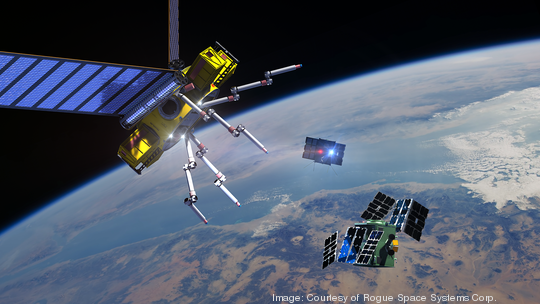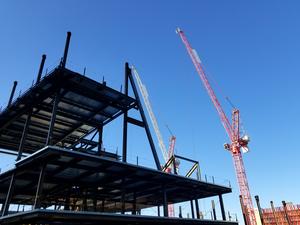
There are more than 5,400 satellites currently orbiting the Earth, according to the Union of Concerned Scientists, and some of them —plus other space junk — will inevitably fall back to the surface. Earlier this month, one did. Debris from a large Chinese rocket fell into the Indian Ocean — luckily, most of it burned up as it flew through the atmosphere.
As the amount of space debris grows exponentially, companies like New Hampshire-based Rogue Space Systems Corp. are developing new tools to service spacecraft in orbit or safely remove them from space. The company’s projects are funded by the U.S. Space Force.
“In 2021, we put more mass into orbit in just that one year than all of the previous 70 years of space exploration combined,” said Jeromy Grimmett, founder and CEO of Rogue. “And now…SpaceX and such are putting Starship into the fleet. That’s just going to exacerbate the problem even more.”
The Department of Defense monitors more than 27,000 pieces of “space junk,” which includes natural meteoroid as well as human-made debris like nonfunctional spacecraft. These spacecraft are often left in orbit when they run out of fuel or stop functioning.
Grimmett said there is a danger of the larger debris surviving a fall to Earth and landing in populated areas. Space debris also poses a danger to other space vehicles, including spacecraft staffed by humans like the International Space Station.
“What we’re trying to do is we’re developing technologies that allow us to go and help de-orbit those things in a safer way, in a more controlled way so that it doesn’t go to populated areas,” Grimmett said.
Sign up for The Beat, BostInno’s free daily innovation newsletter from BostInno reporter Hannah Green. See past examples here.
Rogue has announced two robots in its fleet thus far. First is Laura, an inspection and observation robot. This slightly bigger than shoebox-sized robot (Grimmett likens it to a boot box) flies around and uses high-definition cameras and sensors to inspect space debris. Grimmett said they’re developing technology for Laura to diagnose issues and understand the inner workings of orbiting machines with no contact. Rogue is also building Fred, a robot that can move satellites and other assets.
“It can change out the tools on the end of its robot arms and it can jiggle things. It can refuel. It can do power augmentation, move things from one orbit to another. It can attach tethers and things to another object to increase its drag so that it falls to Earth faster,” Grimmett said.
The company’s goal is to make these robots fully autonomous. Right now, human interaction, combined with AI, operates the robots, Grimmett said.
The first engineering model of their demonstration spacecraft should arrive in New Hampshire any day now.
Going rogue
When people think of space companies in New England, they think of BAE systems, Raytheon Technologies and even Lockheed Martin.
Grimmett said Rogue is viewed as “the dark horse of the space industry.” They like it that way.
“We didn’t want to be the normal company anyway,” Grimmett said. “It’s kind of in the name.”
Grimmett is a U.S. Army veteran who worked as a missile systems and electronics specialist. He later worked as a software engineer and attended Harvard University’s School of Extension Studies.
A few years ago, Grimmett attended MIT’s space conference and learned about the dangers posed by space junk. He realized there was a wide-open market for companies that could repair, remove or recover space debris.
Grimmett founded Rogue in 2020 and located the company in an old mill building on the Winnipesaukee River in Laconia, New Hampshire. Even though they have a physical location, Grimmett said they built the company to operate largely remote to funnel their funding into developing their technology.
Rogue had 11 of its 13 SBIR proposals approved through the SpaceWERX Orbital Prime initiative by the U.S. Space Force. The company will receive up to $2.75 million to develop its technologies. Rogue has around 23 employees.
Grimmett said New Hampshire is the “best kept secret of the Northeast.” He praised the state’s tax incentives, work-life balance and access to Boston-area universities.
Rogue is starting to garner attention in the space industry, Grimmett said, and they’re excited to bring some of that recognition back to the Granite State.
“We’re kind of in the background sneaking up on everybody,” he said. “New Hampshire is kind of a really well-kept secret. People don’t realize how good things are up here.”








